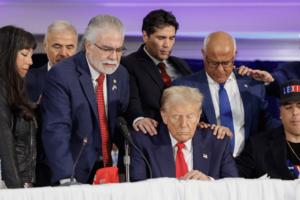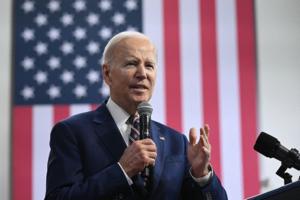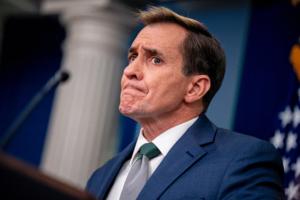Politics
/ArcaMax

Commentary: Alaska is a climate victim and a perpetrator. The next four years will only make matters worse
“I’m just waiting to start hearing methane explosions like they do in Russia,” says Bethel, Alaska, City Council Member Mark Springer. Until recently he and his wife would pick summer berries on a trail through the tundra outside their river town in southwest Alaska, but now that part of the tundra is too dangerous to traverse since water-...Read more

Commentary: Removing a splinter? Treating a wart? If a doctor does it, it can be billed as surgery
When George Lai of Portland, Oregon, took his toddler son to a pediatrician last summer for a checkup, the doctor noticed a little splinter in the child’s palm.
“He must have gotten it between the front door and the car,” Lai later recalled, and the child wasn’t complaining. The doctor grabbed a pair of forceps — aka tweezers — and...Read more

Commentary: Conflict in South Korea reopens the very wounds examined in this year's Nobel laureate's work
When the Nobel committee recognized Han Kang in October for her body of work exploring “the fragility of human life,” it could not have known how relevant the theme would feel in South Korea just two months later.
Han, the first Korean writer to win the Nobel Prize in Literature, has long been interested in the existence of the victims of ...Read more

Frank Barry: The 'War on Christmas' is the wrong fight for Christians
This holiday season brings an extra reason to be joyful: A recent poll found that Americans’ belief in the existence of a “War on Christmas” has fallen dramatically since 2022, to 23%. Peace on earth and mercy mild!
Perhaps with the ongoing “invasion” of our southern border, Fox and other conservative networks have decided that it’s...Read more

Commentary: To give great gifts, stop thinking like a gift giver
The idyllic holiday scene — piles of presents, smiles all around — rarely matches reality. Who among us hasn’t faced the awkward silence of a gift that falls flat? Who hasn’t been disappointed by one we’ve received?
Why then, do we get it wrong so often? Why are we so bad at giving gifts? I’ve researched these questions through the ...Read more

Allison Schrager: Make daylight saving time permanent? The US economy says yes
President-elect Donald Trump’s latest promise is to eliminate Daylight Saving Time, which would mean putting the U.S. on Standard Time year-round.
Billionaire DOGE bosses Elon Musk and Vivek Ramaswamy, meanwhile, seem to want to make Daylight Saving Time permanent. Is this just a miscommunication? Or is the incoming administration as divided...Read more

Commentary: Why I'm getting rid of my smartwatch
The first thing I do each morning is check my watch — not for the time but for my sleep score.
As a runner, when the glowing red letters say my score — and my training readiness — are poor, I feel an instant dread. Regardless, I scroll on, inspecting my heart rate variability and stress level — snapshots that influence the tone I carry ...Read more

Commentary: What connects us in this polarizing moment through space and time and humanity
Reeling from a divisive and turbulent election season, many of us seek spaces of solace, light, unity and worship as we turn toward the winter holidays.
The cosmos and its reflection within us harbor such spaces.
By viewing and embracing scientific insights through the lens of humanity, you form a connection with your place in the universe. ...Read more

Juan Pablo Spinetto: Mexico's safest state risks being overwhelmed by its own success
Taking off from Mérida’s airport, in Mexico’s southeastern Yucatán state, offers some breathtaking views: the emerald waters of the Gulf of Mexico, the unusual geography shaped by an asteroid millions of years ago. But you might also note something else: gaps in the forest cover gashed out by massive real estate projects — private ...Read more

Sarah Green Carmichael: Equitable marriages could save lives (and love)
Most Americans who marry say “I do” between 25 and 30 — ages when serious illness is probably not the first thing on their minds. But in a way, tying the knot is a major health decision. For men, just being married is a predictor of living longer. For women, the picture is more complex.
Among men with prostate cancer, married men survive ...Read more

Jackie Calmes: A peaceful transfer of power -- you can thank Biden
Did you miss it? On Tuesday, the electoral college made official what we've known for six weeks: Donald Trump defeated Kamala Harris for the presidency.
Americans could be excused for being unaware that electors met in all 50 state capitals and the District of Columbia to cast votes. In nearly every presidential election year, the ...Read more

Commentary: History will be kinder to Joe Biden than the pollsters
Now that pollsters are declaring President Joe Biden a “failure,” historians will reckon with too many economic signals rendering the prevailing narrative little more than media noise.
From the American Rescue Plan Act of 2021 that ushered in the longest period of unemployment below 4% since the 1960s to the Infrastructure Investment and ...Read more

Editorial: Putin's weaker than he looks. Seize the opportunity
Russian President Vladimir Putin has sought to project an image of economic strength while prosecuting the war in Ukraine, as if he could easily outlast the West’s efforts to counter his aggression. If President-elect Donald Trump and other Western leaders want to negotiate a prudent peace deal, they shouldn’t buy it.
More than most ...Read more

Tad Weber: Elon Musk thinks high-speed rail is wasteful? Cutting funds would be the crime
Sacramento-area congressman Kevin Kiley took to the floor of the House of Representatives recently to declare the following:
“Mr. Speaker, I am very happy to report that the newly formed Department of Government Efficiency has honed in on perhaps the single-greatest example of government waste in United States history,” the Republican from ...Read more

Editorial: Drone phenom sheds light on feds' transparency flaws
It seems everyone has a theory on the nocturnal drone sightings that have alarmed residents in the Northeast. They’re from our government, they’re from a foreign country, they’re planes, they’re just normal drones, they’re extraordinary craft that elude regular detection.
One thing we are sure of: The Biden Administration has dropped ...Read more

Editorial: Trump is guilty and not immune -- His Stormy Daniels hush money conviction remains
Even a terribly wrong-headed decision by the U.S. Supreme Court on a president’s post-White House criminal immunity can’t undo Donald Trump’s 34 felony convictions correctly ruled Acting Manhattan state Supreme Court Justice Juan Merchan.
You remember Merchan, who oversaw Trump’s Stormy Daniels hush money trial downtown in the spring ...Read more

Commentary: Supreme Court ruling on trans care is literally life or death for teens
Last month, the Supreme Court heard arguments on whether banning essential health care for trans youth is constitutional. What the justices (and lawmakers in many states) probably don’t realize is that they’re putting teenage lives at risk when they increase anti-trans measures. A recent report linked anti-transgender laws to increased teen ...Read more

Dan Rodricks: Luigi Mangione and where we are now
In February 1992, chicken magnate Frank Perdue received a pie in the face from a protester in a chicken costume during a meeting of the University of Maryland Board of Regents in Baltimore.
Perdue was founder, president and CEO of one of the nation’s largest poultry processors. More than that, he was the face of the poultry industry because ...Read more

Editorial: Trump lawsuits, threats a clear and wrongheaded effort to bully the press
It’s wrong for the incoming president to start suing newspapers and it’s a transparent effort to bully the press, but there Donald Trump stood Monday, proclaiming that “we have to straighten out the press. Our press is very corrupt. Almost as corrupt as our elections.”
Neither the press nor elections are crooked, but Trump is now suing...Read more

Editorial: Haiti desperately needs a new, bigger UN mission -- and American leadership
As Haiti endures a devastating crisis marked by escalating violence and lawlessness, urgent international intervention is required to address the growing chaos. With President Joe Biden preparing to leave office and Donald Trump poised to take power, the need for decisive action is clear.
Haitians are enduring unprecedented levels of brutality....Read more


























































